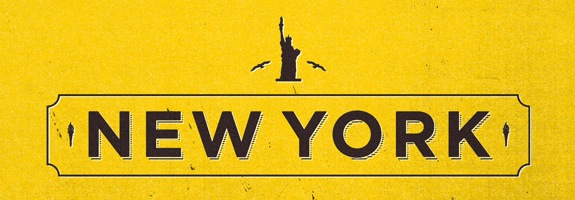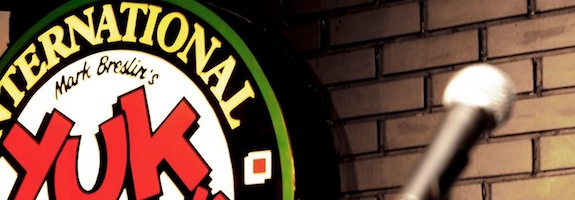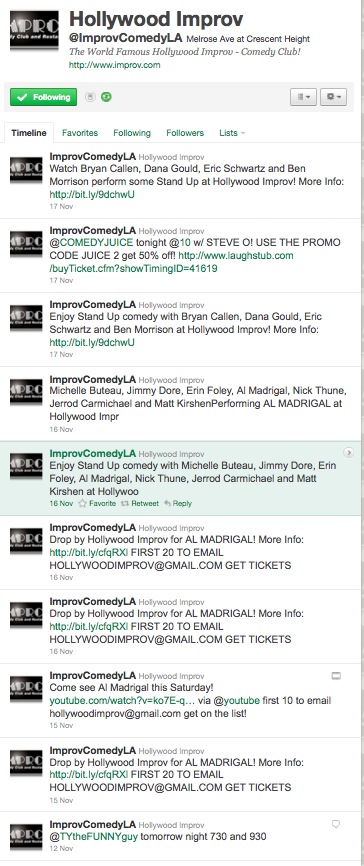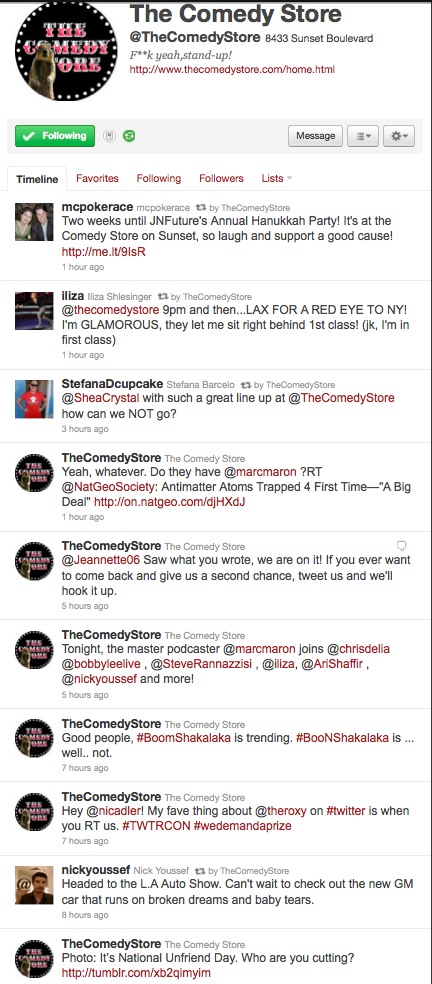This is a guest post from Connected Comedian Tom Cowell, who has lived in New York City for the past 8 years and performed stand-up comedy there for the past five.
If you’d like to write a guest post with an overview of your local comedy scene for Connected Comedy, please email me.
1. You Can Drink In A Lot Of Open Mics…But Also Drown In Them
There are over 160 open mics in New York City, and that’s just counting the ones listed on Bad Slava. There are dozens more that aren’t advertized – you just learn about them if you live here. Getting up multiple times every night is easy if you’re willing to pay $3-$5 for five minutes of stage time (common in Manhattan). And you can get up multiple times a night for free with just a little planning.
When you first move to (or start doing comedy in) New York, you won’t get booked much. So by all means: go nuts with mics. It’s a point of pride for most New York comics that they went through that “three or four mics a night” phase for a while. You should do it too. In a month or two, you’ll be like part of the furniture. Perceptions of time are skewed here. People will think you’ve lived in New York for longer than you have.
But doing three or four mics a night for years and years? I think that’s a mistake, simply because of all the OTHER opportunities available in NYC that you cannot seize if you’re mic-ing that much. Three open mics translates to 15 minutes of stage time, and about three hours of waiting around/traveling to and from venues.
What else could you have done with those three hours? That’s what the rest of this list is all about.
2. You Can ALWAYS Make $50 For A Blog Post
New York is the media capital of the world. Alongside the giant brands (the Viacoms, Hearsts, and News Corps of the world), there are literally HUNDREDS of media outlets – many purely web-based – that constantly crave content and are willing to pay for it. Here’s how to do it…
Take any website you read regularly. Have an idea for a story/article/post? Study the tone and typical format of posts on the site, write it, and submit it. Say they can use it for free. If you can write decently and in the style of the outlet you’re pitching, eight times out of ten they’ll run it (or at least an edited version of it).
Congratulations! You’re now in their stable of contributors. You have demonstrated your value, and they will WANT you to pitch them ideas for stories all the time. And if you’re funny, you have a huge advantage over other freelance writers.
I’ve personally done this twice: pitching an advice column to women’s website The Frisky, and a weekly comedy events run-down to The Village Voice’s “Sound of the City” blog.
The going rate for content in this town is about $50 per post. Sometimes a little more, sometimes a little less. It’s not much, but you’ll be amazed what writing regularly online will do, in terms of boosting your Twitter followers, and getting your name out there as a person of ideas who can create cool stuff. Plus, you’re getting paid to write. Isn’t that better than waiting tables?
3. Breaking Into The Comedy Clubs Is Hard
There are just a handful of “A” room comedy clubs (clubs that work hard to curate high quality shows AND regularly pay for spots) in New York City itself. There are so many comics here, and relatively few opportunities to make spot pay doing mainstream club comedy (urban and Latino rooms are an exception, but they are not worlds I know).
So you’re probably not going to get passed at a New York club for many, many years. In fact, it’s probably easier to get on TV than to get passed as a regular at a New York comedy club. Don’t take it personally – it’s just how it is. You have to make your own opportunities to get them to notice you.
4. You Can Get A Show Business Day Job
If you live in New York, you’re fortunate to reside in one of the two American cities where they actually make professional entertainment. TV, film, radio, theater, publishing…every tentacle of the entertainment “squid” has a huge presence here.
We all want the industry to pay attention to us anyway, so why not work for it? You can learn a lot about how the business actually works just by sorting mail for a production company. You probably won’t be paid much less than you would for just a regular entry-level day job. Even interning for one day a week could be invaluable. With all the opportunities flowing through a city like New York, working within the industry puts you in the best position to know about them first, and to seize them in the savviest way.
5. You Can Build An Acting Tool Kit For Your Big Break
If you’re a comedian, you want to be on TV. But chances are, the first few times you appear on camera, it won’t be doing stand up. It’s much more likely you’ll wind up getting small parts in sketches, web series, sitcoms, or commercials. Considering that, comic improvisation and dramatic acting are invaluable skills. They could be the difference in turning a small opportunity into a potentially much bigger break.
This is another great thing about the New York scene – it’s home to the best improv and acting teachers in the world. Use them. You should try to study at UCB purely for the cache, but if all their classes are full, learn with the PIT, Magnet, or the Annoyance.
They’re each subtly different, but all teach broadly the same thing. You can also study acting with JoAnna Beckson, who specializes in training comics (her former students include Colin Quinn, Bill Burr, Dave Attell, and countless others).
After you get that pilot deal, you’ll be very glad you can actually act and improvise collaboratively when the lights turn on.
6. New York Loves Weird Stuff – And The Weirder The Better
New York is a very safe place to fail. You can do all manner of crazy stuff here. If it works, everyone thinks you’re wonderful. If it doesn’t, no one cares and it’ll be forgotten about next week. So swing for the fences.
Here are three of the most popular comedy shows in New York right now:
See You In Hell! – Comedians Doug Smith and Matt Wayne dress up in devil outfits and make comics perform their regular material while enduring a “hellish” challenge: like being blindfolded and tied to chair, or wearing a bear suit and downing whiskey shots. They have showcased the show for Comedy Central executives, and as we speak are shopping the idea around Los Angeles.
First Comes Love – Comedian Kyle Ayers asks Craigslist users to submit homemade porn scripts. They do, and he produces live staged readings of them with comedians learning the parts. It’s a huge hit, and now he asks Craigslist for themed material: Mad Men, There Will Be Blood, Game of Thrones, etc.
Jesus the Barbarian – Alt-comics Nick Naney and Gonzalo Cordova wrote this comic play, cast their weirdo friends in all the parts, and bought a few gallons of stage blood to really make a spectacle. It was a giant hit at alt-comedy mecca The Creek and the Cave. They’re now making a follow-up production, and off-Broadway producers are sniffing around them.
7. There Are So Many “Scenes” And Nothing To Stop You From Trying Them All
In a city the size of New York, there are subcultures within subcultures. There is the alternative stand-up scene, unofficially headquartered at Queens venue The Creek and the Cave. There’s the UCB scene, arguably the most important hub for improv and sketch writing/production in town.
There’s the Village stand up scene, centered on hustling for spots at the B-rooms (basically everywhere BUT the Comedy Cellar – the famous club in the opening credits of Louie) in and around MacDougal Street. There’s the scene at The Stand, an impressive newer club in the Gramercy area.
Then there is the storytelling scene centered on The Moth, which is a huge gateway to prestige media outlets and the worlds of public radio and publishing. And those are just the communities I know about. You are free to dip your toe into all of them. There is no downside to doing so. You’ll quickly find out what you’re best at, where your sensibilities lie, and the kind of people you like to collaborate with.
That’s my list. What did I miss? What do you think are the most important things to know about the New York comedy scene? Please let me know in the comments, by email, or on Twitter. I love meeting Connected Comedians from around the country, and introducing my city to new performers. If you’re ever in New York, don’t be a stranger. Get in touch.
READ THIS NEXT: 7 Things You Should Know About The Houston Comedy Scene





